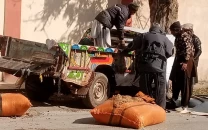PM orders ‘comprehensive road map’ to prevent stunting
Imran chairs maiden meeting of PNNCC; says important issues were ignored in the past
Prime Minister Imran Khan chaired on Monday the first meeting of the Pakistan National Nutrition Coordination Council (PNNCC) where he was informed that the Ehsaas Development Dashboard would start working across the country from today and provide detailed data on stunting.
It may be recalled that in his first address to the nation, the prime minister drew attention to the effects of malnutrition and poor quality food on the mental and physical development of children and had stated that preventing stunting would be a priority of his government.
In the first phase of the Ehsaas Programme, 36 Ehsaas Development Centers had been set up in nine districts, where according to Prime Minister’s Special Assistant (SAPM) on Poverty Alleviation Dr Sania Nishtar, not only food is provided to address the issue of malnutrition among mothers and new-borns but conditional cash was also provided to mothers.
The meeting was attended by federal ministers Shafqat Mahmood, Dr Fehmida Mirza, Syed Fakhar Imam, Asad Umar, Adviser on Commerce Razak Dawood, special assistants Dr Nishtar, Malik Amin and Dr Faisal, secretaries of relevant ministries and senior officers. Provincial chief secretaries also attended the meeting via video links.
Addressing the meeting, Imran said that important issues, like the stunting, were ignored in the past, adding that stunting not only affected children’s mental and physical abilities but also deprived the society of their constructive abilities.
He said that overcoming stunting was a priority of the government and the Federation would play its full role in this regard. He, subsequently, directed Dr Nishtar and the special assistant on health to formulate a comprehensive road map based on timelines for the prevention of stunting in consultation with the provinces, which would then be presented to the Council of Common Interests (CCI).
During the meeting, Dr Nishtar gave a detailed briefing regarding the project, causes of stunting and its effects on the mental and physical development of children, and the past strategies on the malnutrition issue.
Dr Nishtar said that in the last 10 years, plans were made to meet the nutritional needs of women and new-borns, but they were never implemented effectively. As a result, she added, the country had almost 40% of children suffering from stunting today. In Sindh, she said, the average rate is 50%.
The official statement released after the meeting stated that it is the responsibility of the provincial governments to play a pivotal role in controlling stunting. However, it added, the federal government would launch high-level coordination and a comprehensive database pertaining to stunting, ensure provision of information and make special plans for its prevention.
The PNNCC was formed at the national level to better coordinate at the federal and provincial levels with regard to the implementation of governmental plans for the prevention of stunting. The council, comprising eight federal ministers, chief secretaries and experts, aims at curbing stunting and implement a well-organised programme.
Social protection
In addition, Dr Nishtar apprised the prime minister that the International Policy Centre for Inclusive Growth (IPC-IG) had acknowledged Pakistan as one of the top-ranked countries in Asia with regards to the highest number of responses to social protection.
“Afghanistan included many humanitarian interventions; hence Pakistan tops the list,” she quoted Marina Andrade – a researcher at the IPC-IG – as saying. The official website for Ehsaas Programme reveals that Pakistan was described as one of the top-ranked countries in Asia having the highest response to social protection amid Covid-19 pandemic during a global e-conference hosted by the IPC-IG.
The new study was conducted by Unicef, the UN and the IPC-IG to assess social protection response in Asia focusing on an extensive mapping and overview of how social protection measures were deployed by the countries in Asia and the Pacific region in the response to the Covid-19 crisis.
The study reveals that Pakistan covers highest number of responses to social protection in Asia through Ehsaas Emergency Cash. Social protection.org is the key initiative of the IPC-IG, which is supported by the governments of Australia and Germany and is an influential forum of social protection.
The country panel on Asia-Pacific brought together SAPM Nishtar, Indonesia’s Director of Poverty Alleviation and Social Welfare Bapak Maliki, and Cambodian delegate Theng Pagnathun, who discussed social protection responses to Covid-19 in their respective countries.


















COMMENTS
Comments are moderated and generally will be posted if they are on-topic and not abusive.
For more information, please see our Comments FAQ